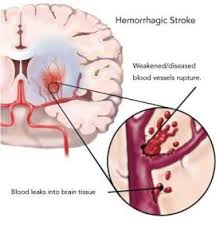hemorrhage
英 [ˈhem.ər.ɪdʒ]
美 [ˈhem.ɚ.ɪdʒ]
- n. [病理] 出血(等于haemorrhage);番茄汁
- vt. [病理] 出血
- vi. [病理] 出血

记忆方法
将“hemorrhage”拆分为“hemo-”(与血液相关的前缀)和“-rrhage”(类似“rhage”的后缀,意味着“流”)。结合在一起,可以想象成血液大量流动、流失的状态,即出血。这种方法帮助你将单词的含义和结构联系起来,从而更容易记忆。
以上内容由AI生成, 仅供参考和借鉴
英语词源
- hemorrhage (n.)
- c. 1400, emorosogie (modern form by 17c.), from Latin haemorrhagia, from Greek haimorrhagia, from haimorrhages "bleeding violently," from haima "blood" (see -emia) + rhage "a breaking," from rhegnynai "to break, burst." Related: Hemorrhagic.
- hemorrhage (v.)
- by 1882, from hemorrhage (n.). Related: Hemorrhaged; hemorrhaging.
Slang in Reports: B.I.D. for "Brought in Dead" and "Dotty" are, [Mr. Sidney Holland of London Hospital] considers, permissible expressions, but he draws the line at "fitting" and "hæmorrhaging." Only such terms, he says, should be used as outside doctors will understand. We would say that on a point of such odiously bad taste he might have been much more severe. [Lavinia L. Dock, "The American Journal of Nursing," 1906]
权威例句
- 1. These drugs will not be used if hemorrhage is the cause of the stroke.
- 药品禁忌症:出血性中风忌用。
- 2. The objective is to study the imaging features of adrenal hemorrhage in neonates.
- 目的是探讨新生儿肾上腺出血的影像学特征。
- 3. The patient died from acute cerebral hemorrhage.
- 患者死于急性脑溢血。
- 4. He sank into a coma after suffering a brain hemorrhage.
- 他在脑溢血后陷入了昏迷。
- 5. Also during that year, Nino Valenti died of a cerebral hemorrhage.
- 另外,在那一年里, 尼诺-华伦提脑溢血死了.